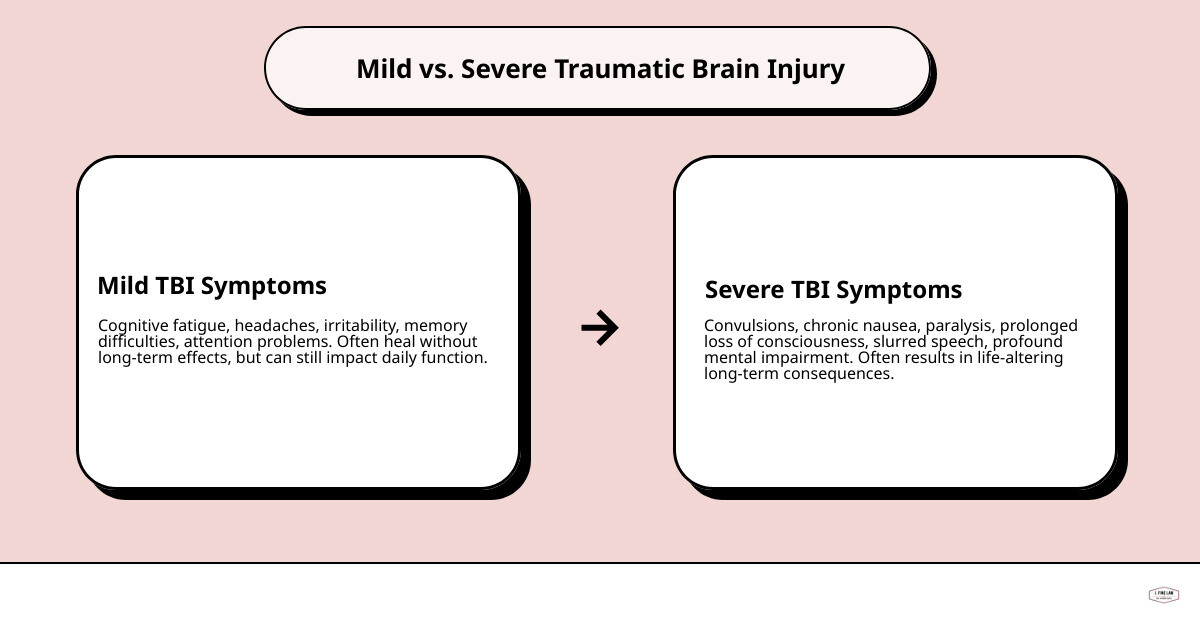Why Finding the Right Head Injury Attorney Can Make or Break Your Case
When you need an attorney head injury specialist, you’re facing a complex area of personal injury law. These injuries are often invisible but can devastate your life, and insurance companies are reluctant to pay for the long-term consequences.
Key factors when choosing a head injury attorney:
- Experience with TBI cases: Specialized knowledge of complex medical evidence.
- Access to medical experts: Connections with neurologists, rehabilitation specialists, and vocational experts.
- Proven track record: A history of successfully fighting lowball settlement offers from insurance companies.
- Understanding of long-term impacts: Knowledge of the cognitive, emotional, and physical consequences.
- No upfront fees: Contingency-based representation to protect your finances.
While many head injuries heal, a traumatic brain injury (TBI) can cause lasting impairment. The stakes are enormous: TBIs are a leading cause of death and disability, with car accidents being the primary cause. These injuries don’t just affect you; they burden your entire family. Even a “minor” TBI can cause cognitive fatigue, memory issues, and irritability, potentially ending a career. A small drop in function can lead to a complete loss of your livelihood.
I’m Jason Fine, a ten-time consecutive Pennsylvania Super Lawyer nominee with over 25 years of experience representing head injury victims. As a specialized attorney head injury cases require, I understand how insurance companies try to minimize these “invisible” injuries and fight to secure the compensation my clients deserve.
Why You Need a Specialized Attorney for a Head Injury Claim
When you’re dealing with a head injury, the legal side can be as complicated as the medical side. A specialized attorney head injury expert handles the legal maze so you can focus on getting better.
Understanding the Injury and Its Consequences
Head injuries, especially traumatic brain injuries (TBIs), are complex and can alter your life forever.
Common Causes of TBIs
- Car accidents: The leading cause, responsible for over 50% of TBIs. If you’ve been in an accident in Cherry Hill, know your rights. More info about car accidents in Cherry Hill, NJ.
- Slips and falls: These account for many concussion-related ER visits and can result from hazards like wet floors or icy steps.
- Workplace accidents: Common in construction and manufacturing, these incidents are often preventable and can involve falls or being struck by objects.
Recognizing the Signs: Mild vs. Severe
Brain injury symptoms can be delayed and vary widely.
- Mild TBI (Concussion): Symptoms may not appear immediately. Look for persistent headaches, dizziness, fatigue, and sensitivity to light or sound. Cognitive effects include confusion, memory problems, and difficulty concentrating. Emotional changes like irritability or anxiety are also common.
- Severe TBI: These are often life-threatening. Symptoms include convulsions, persistent severe headaches, weakness in limbs, or loss of consciousness, requiring immediate medical care.
The Mayo Clinic offers detailed information on TBI symptoms. Scientific research on TBI symptoms and causes.
A TBI can fundamentally change who you are, affecting you cognitively, emotionally, and physically. As your attorney head injury specialists, we understand the true cost of these “invisible” injuries and fight to ensure it’s recognized.
How an Attorney for a Head Injury Steers Insurance and Liability
Dealing with insurance companies after a head injury is a battle. Their goal is to minimize payouts by denying your claim, arguing your symptoms are pre-existing, or offering a quick, lowball settlement before the full extent of your injury is known. This is especially common with mild TBIs, where damage isn’t always visible on standard scans.
Proving liability is also challenging, as the “invisible” nature of brain injuries and potential memory loss can complicate your case. This is where the right attorney head injury team is essential. We act as your shield, handling all communication with insurers, investigating the accident, and building a strong case. Our 98% success rate at J. Fine Law comes from knowing how to counter these tactics, negotiate effectively, and take a case to court when necessary.
The Crucial Role of Medical Experts in Your Case
Medical evidence is essential in head injury cases. Because these injuries are often invisible, a team of medical experts is needed to explain the connection between the accident and its life-altering consequences.
Your Expert Medical Team May Include:
- Neurologists: To diagnose the TBI, assess its severity, and project long-term issues.
- Neuropsychologists: To objectively measure cognitive and emotional changes (e.g., memory, concentration).
- Rehabilitation Therapists: To detail how the injury impacts daily life and what ongoing therapy is needed.
- Vocational Experts: To calculate lost earning capacity and retraining costs.
- Life Care Planners: To map out the lifetime costs of care for severe injuries.
These experts make the invisible visible by linking the accident to your symptoms and quantifying your future needs. As your attorney head injury firm, we have strong relationships with leading medical experts in Pennsylvania and New Jersey, ensuring your case has the credibility it needs to succeed.
Building Your Case and Securing Maximum Compensation
Building a winning head injury case means telling your complete story in a way that insurance companies and courts can’t ignore. As your attorney head injury advocates, we know what evidence will make or break your claim.
What an Attorney for a Head Injury Needs to Build a Strong Claim
Key evidence we will collect includes:
- Medical Records: The complete history from the ER to ongoing therapy, including notes from specialists like neurologists and neuropsychologists.
- Diagnostic Tests: MRIs, CT scans, and advanced imaging can help illustrate the extent of the injury.
- Official Reports: Police and accident reports provide an objective account of the incident, which is crucial if your memory is affected.
- Witness Statements: Testimony from people who saw the accident or have observed changes in you can be powerful proof.
- Financial Records: Pay stubs and tax returns help us calculate lost wages and diminished future earning capacity.
- Personal Journal: Documenting your daily struggles provides a compelling record of your non-economic damages.
Starting this process immediately is critical, as evidence can be lost over time. We work quickly to preserve every piece of information vital to your claim.
Calculating and Claiming Fair Compensation
Many TBI victims are shortchanged because they don’t understand the full scope of compensation they can claim. Insurers often offer quick settlements that ignore the massive long-term costs of a brain injury.
We fight for full compensation, which includes:
- Economic Damages: These are tangible costs, including all past and future medical bills, rehabilitation, lost income, and your diminished earning capacity over your lifetime.
- Non-Economic Damages: This compensates for intangible losses like pain and suffering, emotional distress, and the loss of enjoyment of life.
Calculating these damages requires expertise. Our track record of securing over $50 million for clients demonstrates our ability to maximize recovery. The goal is to secure resources for a lifetime of managing your TBI. For more on personal injury claims in Philadelphia, see here: More info about personal injury claims in Philadelphia.
The Legal Process: Timelines and What to Expect
Understanding the legal process can reduce anxiety while you’re recovering. Here’s what to expect.
Critical Filing Deadlines
Time is of the essence. Both Pennsylvania and New Jersey have a strict two-year statute of limitations from the date of injury to file a lawsuit. If you miss this deadline, you lose your right to compensation forever. Contact an attorney head injury specialist immediately to protect your options.
The Claim Timeline
While simple cases can resolve in months, complex TBI claims may take longer. The process generally follows these steps:
- Investigation: While you focus on medical treatment, we gather evidence and consult experts to understand the full extent of your injuries.
- Negotiation: Once your prognosis is clear, we send a detailed demand package to the insurer. Many cases settle at this stage.
- Litigation: If the insurer refuses a fair offer, we file a lawsuit. This often prompts more serious negotiations, and most cases still settle before trial.
- Trial: While a last resort, we are always prepared to fight for you in court. Our 98% success rate proves we are ready to win.
Throughout this process, J. Fine Law provides rapid attorney response and constant communication. We handle the legal complexities so you can focus on your recovery. If you have a TBI case in Pennsylvania, we can help. Get help with your traumatic brain injury case in Pennsylvania. You don’t have to face this alone.



